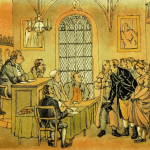Mad Men Recap 6.10: “Be slick, be glib, be you!”
Sterling Cooper Draper Pryce Cutler Gleason and Chaough have an identity crisis. “SCDPCGC” is the unofficial seven letter branding, but few people know it, and fewer still get it precisely right. Near the beginning of “A Tale of Two Cities,” the partners of the newly merged firm convene for a brief meeting in the boardroom, and Jim Cutler complains that they received mail addressed to Sterling Gleason and Pryce. “From who?” Roger Sterling says. And Cutler responds, “It doesn’t matter. They don’t know our name, because we don’t know our name.” A spirited back-and-forth ensues about what the company name ought to be. On the surface, it’s a marketing problem. “SCDPCGC” is cumbersome in print and sounds graceless on the phone. But, of course, determining the firm name is also a loaded power struggle involving whose name will be listed first or which names will be listed at all. The dust hasn’t settled since the merger and each partner is struggling to secure an advantageous, if unspoken, place in the hierarchy of authority. And, at least in part, that’s the point. Part of the firm’s identity crisis–the anomalous Bob Benson excepted–is that cooperative, well-functioning relationships seem impossible in their dog-eat-dog world.
“A Tale of Two Cities,” then, is in certain ways about identity problems among organizational bodies. Most notably, Cutler and Ted Chaough recognize a power struggle with Don Draper and Roger Sterling, while Pete Campbell and Joan Harris are desperate to remain relevant and needed. And, in the background of the firm’s power struggle, is the 1968 Democratic National Convention which highlights political dissent between liberals and conservatives amidst the escalating violence of assassinations, riots, and wars. The firm’s internal battle and the country’s ideological struggle interweave when Michael Ginsberg and Cutler have at it over the Vietnam War. Even Bob Benson can’t calm that storm. But when Cutler goes to complain to Chaough, it doesn’t have anything to do with fascist businessmen or hypocritical hippies. Instead, Cutler simply recommends that they “remove the rest of their people” while Don and Roger are conveniently on a trip to Los Angeles, meeting with Carnation. Cutler’s insistence that they get rid of Ginsberg in particular is met with resistance from Chaough, who says that part of the problem is he’s seeing the situation as one involving “our people” and “their people,” when he needs to start “holding hands.”
The other power struggle at the office is between Pete and Joan. The latter has lunch with a powerful Avon executive, and is on the verge of securing the potential new client. Joan tells Peggy, who tells Ted, who brings Pete into the mix. It’s assumed that Joan will continue to play her role, which means she’ll submit to partners like Pete to take care of securing the client. But this time Joan sees an opportunity for legitimation of her status as partner. Pete is incensed when Joan purposefully leaves him out of the picture in the meeting with Avon, and at first, Peggy isn’t supportive of Joan either. Even Peggy and Joan are initially at odds over the latter’s decision to take the lead in pursuing Avon. Underlying the tension seems to be a tinge of competitive resentment. Joan has envied the respect Peggy has earned, and even suspected that she must have slept with Don; like most everyone else, Peggy sees Joan’s acquisition of the partnership as illegitimate given the means by which she attained it. It seems as if the reiterated calls to “get along” during the episode remain only superficial admonitions until Peggy decides to help Joan get out of her bind with Pete and Ted. Ultimately, it’s Peggy’s willingness to boldly risk herself on Joan’s behalf that gives the latter the opportunity that she’s been looking for–and somewhat humorously to Pete’s spoil.
Lastly, in a more literal sense, the “two cities” in this episode are New York and Los Angeles. Things get weird–70’s weird, you might say–when Harry takes Don and Roger to a Hollywood party. It’s a different world than the Madison Avenue one they inhabit. On the plane ride to LA, Roger tells Don that he needs to stop working so hard and worrying so much. Couched in another reference to the internal conflict at work (“We’re executives–leave the drudgery to Ted Chaough and the rest of the underlings!”), Roger believes the LA company men will be beholden to their New York City elite status. “Be slick, be glib, be you!” he tells Don.
The two of them try to play it cool at the Hollywood party, but they’re clearly anxious to adapt to–and to dominate–the scene. Humorously, Roger ends up on his knees after a literal low-blow from former copywriter-turned-Hollywood producer Danny Siegel gets fed up with his former boss’s incessant mockery. Less humorously, Don is enticed to smoke hashish, and begins hallucinating about Megan and PFC Dinkins. Don’s “slick, glib”–real–self is rarely shown for what it is during an advertising pitch. But the image of Don face-down in a pool of water, needing to be rescued from the clutches of death? It’s the sort of truthful image that’s at work in the midst of these identity crises.
Mad Men Recap 6.11: Don has children, too
The eleventh episode of Mad Men–titled “Favors”–is filled with all manner of apparent, or potential, kindnesses. The latest instance of Bob Benson–the seeming king of favors–helping Pete Campbell was by securing a reliable caretaker for his increasingly delusional mother. Peggy Olson, meanwhile, is being terrorized in her apartment by a rat, and she calls her old pal Stan Rizzo to come dispose of the rodent. And when the Rosens are met with the frightening prospect that their son–a 19 year old college dropout newly categorized “1A”–is now a potential draftee for military service, Don offers to see if any of his government-connected clients can offer some advice or help for dodging the situation.
Of course, this is Mad Men, and therefore it’s more likely that good deeds aren’t just good deeds. So Bob may not have meant to provide Pete’s mother with a caretaker who also services her sexually, but it sure seems now that some of his care-taking for Pete was motivated by sexual desire. And when Peggy calls up Stan for rat-termination help, his resistance to help isn’t all that surprising to Peggy. Without hesitation, she tries to offer the prospect of sex as a return favor. She’s surprised to find reluctance still, but only until Stan reveals that he’s already found sexual favor, and he’s in bed with her during Peggy’s moment of need.
And Don?
When Sally complains to her mother that at least her father supports her, and “doesn’t think I’m just a pain in the ass,” it’s a loaded moment of foreshadowing when Betty says with as much sarcasm as she can muster, “Yes, your father’s a real hero.”
Somehow, Megan is still under that illusion when Dr. Rosen stops by with his son to thank Don for the favor he’s performed for them. “Don, I owe you,” he says. Filled with just as much gratitude, Megan proclaims that Don is “the sweetest man.” But Sally, sitting at the table looking shamed and confused, knows better. Earlier that afternoon, she walked in on Don and Sylvia having sex. And it seems clear that Don’s favor for the Rosens was in service of his attempt to reconcile with his former mistress. But caught in the affair by his daughter, Don drowns his guilt in alcohol. Drunk, he arrives home for dinner and to the reception from Dr. Rosen. And so with Sally at the table–clearly scarred by what she’s seen–all of the praise and admiration from Dr. Rosen is the worst kind of irony.
During the episode, Don’s go-to response when explaining his decision to help the Rosens is “I have kids, too.” But the thing about favors is that often an ungracious self-interest is just beneath the surface kindnesses. Don’s despair in the end of the episode stems from his own legitimate recognition that yes, indeed, he does have kids, too. And one of them has just seen her father’s dark, destructive secrecy in an embarrassingly revealing light. Beneath the slick, glib surface is a desperate and selfish person with a shriveling soul.
Mad Men Recap 6.1 & 2: The Hawaiian Dark Wood
Mad Men Recap 6.3: Sexual Collaborations as Trade Secrets
Mad Men Recap 6.4: The Many Roles that Mad Men Play
Mad Men Recap 6.5 & 6: Hoping for Eucatastrophe, Worrying about the Bomb
Mad Men Recap 6.7: Are Good Deeds Ever Just Good Deeds?
Mad Men Recap 6.8 & 9: What Holds People Together, A Wellspring of Confidence















